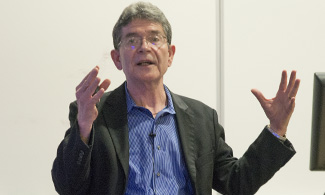Wednesday, December 2, 2015
Duke University professor shares research about religion in health care
Wed, 02 Dec 2015Shelley Andrews :: LUCOM Marketing and PR
Physicians spend years in medical school learning how to assess the needs of a person’s body and mind. In a presentation at Liberty University College of Osteopathic Medicine (LUCOM), Harold Koenig, M.D., explained why health care providers should focus on whole-person care that includes a patient’s spirit, specifically the religion they practice.
During his years as a family physician and a geriatric internal medicine specialist, Dr. Koenig started to notice a trend among his patients.
 “Many people, not just older adults, turn to religious beliefs when they experience change, loss, and especially problems with their health,” said Dr. Koenig, currently the Director of the Center for Spirituality, Theology and Health at Duke University.
“Many people, not just older adults, turn to religious beliefs when they experience change, loss, and especially problems with their health,” said Dr. Koenig, currently the Director of the Center for Spirituality, Theology and Health at Duke University.
He began doing some research to see how common it was for patients to use religion to cope. Dr. Koenig also wanted to find out if turning to religion improved a patient’s long-term health.
In his presentation at LUCOM on Nov. 19, Dr. Koenig shared some of the numbers; more than 40 percent of 337 consecutively admitted patients to Duke Hospital said religion was their most important coping factor, 27 percent said it was a large extent or more and close to 23 percent said they used religion in a moderate or large extent to cope.
Other statistics Dr. Koenig presented proved religious involvement is related to lower blood pressure, better cardiovascular functions, less coronary artery disease and less depression/faster recovery from depression.
“Religious beliefs give meaning to illness and provide motivation to work hard to get better. These beliefs also encourage a healthy lifestyle that enables people to stay healthy, especially as they grow older,” said Dr. Koenig.
Dr. Koenig says he hopes student-doctors left his presentation with a new understanding.
“Religious involvement is good for the mental, social, and physical health of patients and should be supported and encouraged by medical doctors as a way to maintain health and best respond to the medical treatments being prescribed,” said Dr. Koenig.
Dr. Koenig says physicians need to inquire about patients’ spiritual beliefs and needs, support those beliefs, and, ultimately, connect individuals to an appropriate chaplain.
He also has a message for the health care system as a whole: train physicians to provide whole person care and give them time to assess a patient’s spiritual needs.
“The way the system is working now? It’s not working,” concluded Dr. Koenig. “We’ve got to do something different, and providing whole person care – that includes the spiritual aspects of health and illness – is what is missing now and needs to be done.”